Social Justice

James Mangold’s A Complete Unknown is a striking film. Centered on a young Bob Dylan (Timothée Chalamet), the biopic chronicles the folk music community that bounced in and around 1960s New York City, offering stellar musical and acting performances in the process. But its wisest scene takes place off stage in an intimate conversation between Dylan and Pete Seeger (Edward Norton).
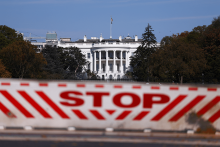
Trump’s campaign was marked by racist and misogynistic rhetoric, promises of authoritarian tactics including dramatic expansion of executive power and retribution for his political rivals, as well as policies that appealed to the anxieties of conservative religious communities, especially Christians.
As faith and justice leaders absorbed the news of a second Trump term, many pointed to the importance of fostering and caring for self and neighbor while figuring out what to do over the next four years.

Horror fiction is one of the first spaces to grapple seriously with concerns of justice. (No, really!)
With that in mind, I present five movies you can watch during spooky season that will not only thrill and chill you, they’ll also spur you to think and act for justice.
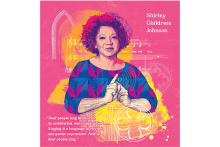
CLIMATE ACTIVIST, GRANDFATHER, and professional cellist John Mark Rozendaal blocked the entrance to Citibank headquarters this summer to protest one of the globe’s biggest funders of fossil fuel expansion. Hugging a fire-engine red instrument, he played a few bars of Bach and was promptly arrested. “The purpose of music is to sober and quiet the mind,” he said to the crowd, “to make it susceptible to Divine influences.” His cello bears the inscription: “This machine loves, serves + protects life.”
Small courageous acts of joy are proliferating. In this issue, Rev. Moya Harris quotes rapper Chuck D to confront troublesome forces in this election season and Chris Crawford, a Catholic at Protect Democracy, urges Christians to become poll workers.
While we mourn the passing of civil rights activist, historian, and song leader Bernice Johnson Reagon, we are grateful for associate editor Josina Guess’ celebration of her life. Reagon’s singular voice demanded that we remember our freedom saints, of whom she is now one. Liz Cooledge Jenkins, reflecting on burnout and social activism, reminds us: “Joy, it turns out, is essential to the work of justice.”

DORCAS CHENG-TOZUN, author of Social Justice for the Sensitive Soul (Broadleaf), wanted to be an “unceasing voice” for social justice. “And while I was busy saving the world,” she writes, “I would also be the kind of person who’d happily sacrifice anything for a good cause.” But 10 months after Cheng-Tozun moved from the U.S. to China to set up an operations office for her spouse’s solar business, thrilled at the possibility of providing affordable electricity to billions of people, she experienced the “worst and longest panic attack” of her life. For more than a year, she could do “little more than sleep and cry and journal.” A crucial, difficult question arose: “Why can’t I handle what everyone else seems to be managing perfectly well?”
For Trish O’Kane, author of Birding to Change the World (Ecco), the breaking point was Hurricane Katrina, which destroyed her New Orleans home and neighborhood. “After a disaster,” O’Kane reflects, “you just can’t do as much. Nor should you. You need time to think, to ponder ... I needed a great slowing down.” She took up knitting, spent long hours outdoors on the ground “watching the clouds change shape and bumblebees loading their back legs with pollen and the yard birds going about their business.
Like Cheng-Tozun’s year of sleeping, crying, and journaling, these months surfaced life-changing questions for O’Kane. “I could feel my question changing,” O’Kane writes, “from What should I do? to How should I be?”
In their respective books, Cheng-Tozun and O’Kane write from the other side of activist burnout — something Cheng-Tozun experienced after working for multiple social justice organizations, and O’Kane after working in human rights journalism in conflict areas, both for many years. Both writers ponder how to change, heal, and move forward. Birdwatching was the gateway for O’Kane, while Cheng-Tozun found herself reflecting on sensitivity, introversion, and the many ways people are wired with different gifts to offer. They have different backgrounds and stories — Cheng-Tozun is now a writer and consultant who most recently worked for a Christian nonprofit that equips BIPOC contemplative activists; O’Kane is an environmental educator who created the “Birding to Change the World” program at University of Wisconsin-Madison — but both authors offer a similar invitation to those who yearn to make a difference: Learn to embody gentler, more sustainable ways of doing so.

Gospel music is my oasis in troubled times. My colleagues can also attest that it’s the background music by which I conduct most of my work.
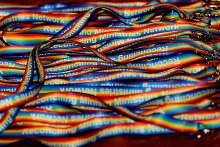
United Methodist Church delegates voted on May 1 to remove a ban on ordaining gay clergy and to allow LGBTQ+ weddings.
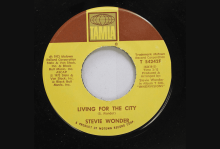
THE OPENING IS spare, just electric piano over a gently throbbing synth bass line, and then the vocal: “A boy is born in hard time Mississippi / surrounded by four walls that ain’t so pretty.” The radio cut of Stevie Wonder’s 1973 hit song “Living for the City” is a four-verse sketch of a loving Black family who work hard, live right, and yet can’t get ahead under the racist economic and social strictures of their Southern town. The instrumentation builds quickly—drums, synthesizer, hand claps, backup vocals—all performed by Wonder. It fades out on a choir of Wonders, singing variations of the chorus: “Living just enough, just enough for the city.”
The album version, more than 7 minutes long, segues from that repeated chorus into a spoken interlude. The boy of the first verse is now a young man arriving in New York City. He is quickly arrested for unwittingly taking a handoff of something illegal and incarcerated for 10 years. The melody and vocals return, heavier, rougher, with Wonder singing from “inside my voice of sorrow” to describe a now broken man who wanders the city, homeless.
“Living for the City” is from the album Innervisions, the third of an astonishing run of five albums Wonder released between 1972 and 1976. During this period, Wonder, a self-taught multi-instrumentalist who made his recording debut in 1962 as a 12-year-old, was stretching lyrically, innovating musically, and embracing a deeper social consciousness.

In Genesis 2, after spending six days forming the earth, God rests “from all the work,” setting a sacred precedent. In Exodus 20:8-10, God instructs the Israelites to embrace patterns of rest. In Matthew 8:23-26, Jesus rests in a boat during a torrential downpour, despite tides rising and crashing against the boat’s hull, threatening to capsize the passengers. We can take comfort in this: If the son of God needed to take a break every now and then, so do we.

STROLLING THROUGH MY neighborhood in East Harlem recently, I noticed whole blocks that felt almost desolate. Along 3rd Avenue I saw stretches of sidewalk once bustling with small businesses, street vendors, the smell of incense, and the sound of West African music, now abandoned amid the echoes of what was.
As a citizen of these barrio streets, the feeling I get is a form of ecological despair. And while some of these places of disinheritance were there before, it seems to have gotten worse during the COVID-19 pandemic. The glitz of gentrification fails to mask increased homelessness, open substance use, and the fatigue many parents and caretakers have experienced, even after the mandated quarantine ended.
At the height of the pandemic, I remember someone telling me, “We’re all in the same water but not the same boat.” Yes, it’s true, the privileged and those who are poor have been hit by the pandemic in multiple ways, but the impact is always felt differently among the most vulnerable. Yet here we are together—a part of the same ecosystem. I’ve done funerals for the poor and the privileged alike; grief has a way of making us feel more tender and more human.

What rekindles our worship and wonder, causing us to reflect and repent, prompting us to hope and rejoice in this particular season of Advent? Perhaps the same spirit that moved abolitionists, advocates, and allies to pen our favorite holiday hymns can remind us of our reasons to rejoice.
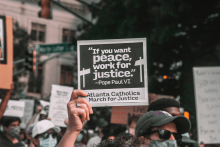
Last week, Archbishop José H. Gomez assailed “new social justice movements” as “dangerous substitutes for religion.”
Gomez, the president of the U.S. Conference of Catholic Bishops, spoke to the Congress of Catholics and Public Life, an international conference held in Madrid, but his comments spread beyond the direct audience. His remarks focused on “the new social movements and ideologies” that he said were “seeded and prepared for many years in our universities and cultural institutions;” movements that were “unleashed” on society after George Floyd was killed in May 2020.
“In denying God, these new movements have lost the truth about the human person,” he said. “This explains their extremism, and their harsh, uncompromising, and unforgiving approach to politics.”
While the archbishop acknowledged that “racial and economic inequality are still deeply embedded in our society,” the comments seemed, to many, to be an effort to delegitimize social justice efforts within the church despite past and present commitments to social justice from Catholic leaders.
Sojourners asked Catholic leaders and thinkers across the United States why social justice is important to their faith. Here’s what they had to say.
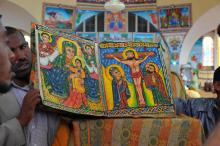
As a Tigrayan and a Christian, I want to know why my fellow Christians who claim to worship the Prince of Peace have engaged in legitimizing violence and death. How do you start with the theology of the gospels — which teaches us to love our enemies, to be peacemakers and to suffer with those who suffer — and end up with a theology that endorses war, rejoices in massacres and destruction, and brands critics as sub-human? Tigrayans are created in the image of God.
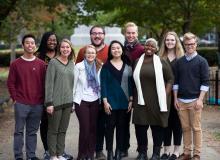
Living in the intentional community feels like living with nine incredible siblings. Holding faith, justice, and empathy as a foundation, we actively choose to get to know each other and allow ourselves to be known.

Americans are more aware of the $99 billion global sex trafficking industry than its existence in the U.S., potentially because many people — Christians included — have a dated understanding of what constitutes sex trafficking.
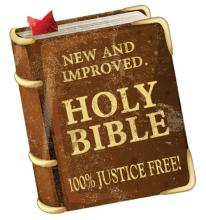
TIME, THE GREAT healer, had almost cleansed my memory of “The Nashville Statement,” that unhelpful treatise from conservative Christians insisting that gay people keep their hands to themselves, despite being squeezed together in the closets they should return to, biblically. But now, only a year later, another document comes out, equally unhelpful, and almost identical in its utter lack of theological necessity.
It’s called “For the Sake of Christ and His Church: The Statement on Social Justice and the Gospel,” and to its credit, it omits the Nashville sex talk, no doubt a disappointment to Bible belters always eager for an excuse to get sweaty and judgmental. The new statement instead focuses on another topic: justice.
Drafted by pastor and author John MacArthur (yeah, I’d never heard of him either) and other Christian leaders, it assumes Christians have grown weary of turning the other cheek (so tedious) or loving your neighbor as yourself (BORING!) and asserts that the gospel has nothing to do with empathy or working for the common good.
“WE DENY that political or social activism should be viewed as integral components of the gospel or primary to the mission of the church.”
You pretty much knew where the author was heading with those first capital letters. “WE DENY” sets a certain tone that brooks no discussion, offers no compromise, and please don’t let my granddaughter hear of it or she’ll be even more expressive when refusing her vegetables.

WHEN JONATHAN MCGUIRE leaves his driveway, he has a choice. Turn right, and the pastor of Rockaway Beach, Mo.’s Bridge of Faith Community Church will hit the state highway with a clean shot into the thriving tourist mecca of Branson. Turn left, and he’ll find himself in downtown Rockaway Beach, a community left behind in Branson’s tailwinds.
Early on, McGuire’s neighbors gave him some sardonic, not-quite-tongue-in-cheek advice. They told him: “Never turn left.” Turning left, says McGuire, means “you have to acknowledge that there’s a problem.”
And yet, despite the difficulties, McGuire and his congregation have turned left into the heart of the uncomfortable messiness of poverty, but also into the heart of their community.
They’re not alone. I went looking for congregations living a vision for biblical social justice along the unique contours of rural America. I spoke to leaders seeking a just and hopeful future for their communities and discovered stories of people who are building relationships, advocating for the common good, and agitating for culture change.
Mobilized by love of neighbor
The economic reality of rural America is diverse. Pockets of robust growth exist within driving distance of vibrant cities and gorgeous natural amenities. Yet many towns face profound challenges. They’re communities fractured by generational poverty, addiction, and—perhaps surprisingly in breadbasket regions—food insecurity.
In places like this, it’s often the rural church that takes on the role of change agent. Social justice runs deep in the scriptures, given voice by the Old Testament prophets, embodied in Jesus’ life, and lived out in the upside-down economics of the early church (see Micah 6:8; Luke 4:18; Acts 2:44-45). And yet, as Jordan Rasmussen with the Center for Rural Affairs (CFRA) in Lyons, Neb., explains, social justice “can be an off-putting term for rural residents.”

White Christians benefit the most by being nationalistic and patriotic, because to do so upholds the methods of “law” that keep their societal privileges in place. So while America — it’s governmental machinations and economy — serves to continually bless and protect white Americans, it hasn’t done so for others. Incarceration rates, a vast history of enforced racism by the legislative, judicial, and justice branches of government, the mistreatment of people of color within the military, and the brutalization by police show just how one-sided our country has benefited particular groups of people because of race. As white Christians blissfully sing ‘God Bless America’ in their sanctuaries adorned with American flags, they look upon their country — and its many structures — with nostalgic pride, while others see betrayal, hurt, and suffering.

DEBATE THE CHOICE all you want, but what was radical about a congressional candidate’s ban on press at an August public town hall event wasn’t her decision to shut out journalists. It was how publicly she was willing to attempt new things, to try to make democracy work for a new slice of participants.
“We are genuinely trying to create environments where our constituents feel comfortable expressing honestly and engaging in our discourse,” she tweeted. “Genuine Q?: how should we label a free campaign event, open to all, that’s a sanctuary space?”
Though she and other justice-minded public officials may not use these words, what they are attempting is a kind of human-centered design.
Human-centered design is fairly self-explanatory: When designing systems, services, or products, creators place humans at the center. But in practice, this can be radical: If my focus is to make an experience better for each user, I will design for individuals, not market trends; I will design for the outliers and anomalies, not the majority.
And, critically, it requires empathy, using every tool I can muster to fully understand what the user experiences as they interact with the system, solving problems worth solving.
Of course, the best way to learn the process is to go through it yourself.
Designer Antionette Carroll lives in Ferguson, Mo. After Mike Brown was killed in Ferguson, she asked herself, “What should designers do?”

MacArthur, at least as I remember him, is not a bitter old man. But he sure sounds like one in his blog series, “Social Injustice to the Gospel.” In fact he sounds exactly like my grandfather who repeatedly says, “I don’t see why everything has to be about race all the time."